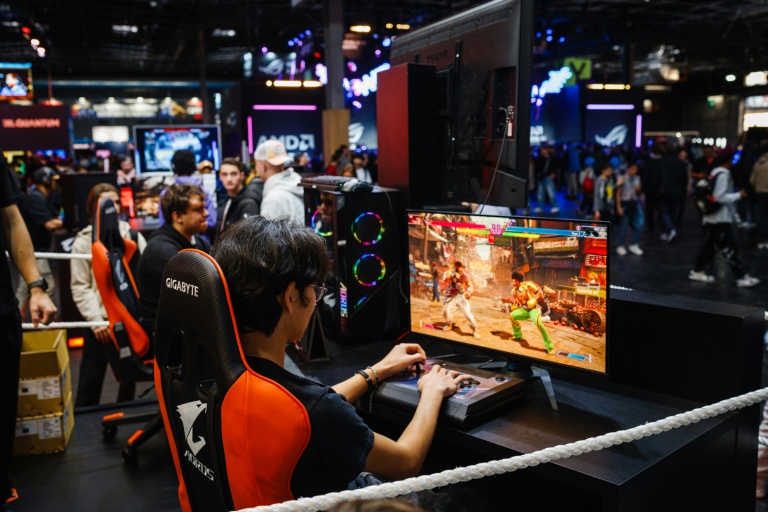Science
Game Developers Grapple with AI’s Growing Role in Industry

Video game developers are increasingly concerned about the implications of generative artificial intelligence (AI) in their industry. While AI has the potential to enhance game development by creating realistic characters and vast virtual worlds, it also raises fears about job security and the creative process. According to Mike Cook, a game designer and computer science lecturer at King’s College London, generative AI is already being utilized more extensively in commercial game development than many realize, albeit in subtle ways like dubbing and coding assistance.
A recent study conducted by the American startup Totally Human Media found that nearly 20 percent of titles available this year on the Steam distribution platform reported the use of generative AI during their development. This figure translates to thousands of games, including popular titles like Call of Duty: Black Ops 6 and the life simulation game Inzoi. As the technology evolves, AI could allow studios to streamline operations, merging multiple roles into a single position, according to AI consultant Davy Chadwick, who anticipates a 30 to 40 percent increase in developers’ productivity.
The rapid advancement of AI tools has led to capabilities that can generate 3D assets from simple text prompts, significantly reducing time and costs. Ethan Hu, founder of the California-based startup Meshy.ai, highlighted the dramatic shift in production costs, stating, “In the past, if you wanted to create a high-quality 3D model, it’s going to take you two weeks and $1,000. Now the cost is one minute and $2.”
Concerns Rise Amid Industry Transformation
The stakes in the gaming industry are high, with the market projected to reach almost $190 billion in revenue by 2025, according to Newzoo. Industry leaders are hopeful that new technologies will enhance productivity while reducing both costs and development time. Yet, a palpable sense of distrust lingers among employees, particularly following several rounds of layoffs in recent years. One anonymous employee from a French game studio remarked, “The tools are supposed to make us more productive but would ultimately mean job losses.”
This sentiment was echoed by another developer who expressed concern over the chaotic nature of AI-generated 3D models, stating, “For the moment it’s frankly a deal-breaker… it takes as much time to fix it up as to make it” from scratch. Such apprehensions have led major companies like Microsoft, Electronic Arts, Ubisoft, and Quantic Dream to remain tight-lipped about their AI usage when contacted.
Despite the fears, proponents of AI argue that it can enhance the creative process rather than replace it. Felix Balmonet, co-founder of the French startup Chat3D, explained, “AI tools allow artists to speed up their creative process by automating busywork.” His company is already collaborating with two of the world’s largest gaming studios, indicating a willingness to embrace AI alongside traditional artistry.
The Competitive Landscape
Some industry professionals worry that opting out of AI tools could jeopardize their competitive edge. The head of a French studio, who prefers to avoid AI, acknowledged the dilemma: “We will have to ask ourselves whether we use them on our next game.” Most publishers and investors contacted stated that AI’s role did not significantly influence their decisions to finance projects.
Piotr Bajraszewski, business development chief at 11 bit Studios in Poland, emphasized the need for caution, recalling the backlash his studio faced after releasing The Alters, which included AI-generated text that was not properly identified. Players criticized the studio for including uncredited AI content, underscoring the ongoing debate about the value of human creativity in gaming.
As the gaming industry navigates this transformative period marked by advancements in AI, developers find themselves at a crossroads where innovation meets apprehension. The balance between leveraging new technologies and preserving the artistic integrity of video games remains a central challenge as the landscape continues to evolve.
-

 Science3 months ago
Science3 months agoToyoake City Proposes Daily Two-Hour Smartphone Use Limit
-

 Health4 months ago
Health4 months agoB.C. Review Reveals Urgent Need for Rare-Disease Drug Reforms
-

 Top Stories4 months ago
Top Stories4 months agoPedestrian Fatally Injured in Esquimalt Collision on August 14
-

 Technology3 months ago
Technology3 months agoDark Adventure Game “Bye Sweet Carole” Set for October Release
-

 World3 months ago
World3 months agoJimmy Lai’s Defense Challenges Charges Under National Security Law
-

 Lifestyle3 months ago
Lifestyle3 months agoVictoria’s Pop-Up Shop Shines Light on B.C.’s Wolf Cull
-

 Technology3 months ago
Technology3 months agoKonami Revives Iconic Metal Gear Solid Delta Ahead of Release
-

 Technology3 months ago
Technology3 months agoApple Expands Self-Service Repair Program to Canada
-

 Technology3 months ago
Technology3 months agoSnapmaker U1 Color 3D Printer Redefines Speed and Sustainability
-

 Technology3 months ago
Technology3 months agoAION Folding Knife: Redefining EDC Design with Premium Materials
-

 Technology3 months ago
Technology3 months agoSolve Today’s Wordle Challenge: Hints and Answer for August 19
-

 Business3 months ago
Business3 months agoGordon Murray Automotive Unveils S1 LM and Le Mans GTR at Monterey









